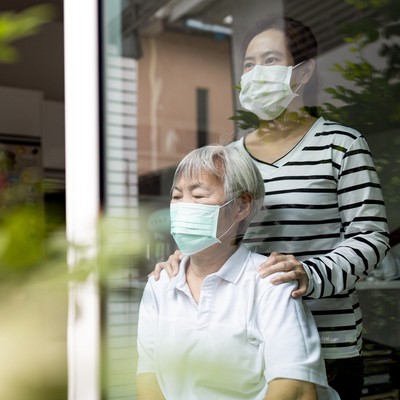Coronavirus

CHRT staff in Health Affairs on strengthening public health through collaboration with primary care
In a recent Health Affairs Forefront piece, Strengthening public health through collaboration with primary care: lessons from the states, CHRT’s Nancy Baum and Samantha Iovan share key findings from research across four states: North Carolina, Oregon, Rhode Island, and Washington. These four states were selected based on the authors’ previous research, which identified these states as innovators in their work …
Read more >
Telehealth for people with disabilities: here are the challenges and opportunities policymakers should consider
Telehealth was a lifeline for people with disabilities during the COVID-19 pandemic. Federal and state policy changes allowed clinics, health systems, and providers to expand telehealth services, which benefitted people with disabilities. People with disabilities, approximately one in every four Americans, are six times more likely to have ten or more physician visits and five times more likely to be admitted …
Read more >
Long COVID’s impact on Michiganders and the Michigan economy
At the time of this publication in May 2022, Michigan has had just over 2 million confirmed COVID cases, excluding deaths. At the percentages indicated in our study and in the literature, 700,000 of these Michiganders could have or may experience long COVID. This could have a major economic burden on families and the state of Michigan due to long …
Read more >
Michigan’s physicians and health care providers are burnt out: What can we do to help them navigate pandemic pressures?
Michigan’s latest COVID-19 surge is among the worst in the country, and if there’s one thing we know about COVID’s effect on our nation’s health care system, physician and health care provider burnout will soon follow. Physician burnout is a concern for everyone. It’s tied to lower-quality care, reduced clinical productivity, and increased physician turnover. In the general population, we …
Read more >
The COVID-19 pandemic has added significant new stressors for family caregivers – here’s why that matters
Nearly 40 percent of all family caregivers find their caregiving situation to be emotionally stressful. When caregivers feel they have no choice in assuming their caregiving duties, this increases to 53 percent. Left unaddressed, caregiver stress can worsen physical, mental, and emotional health, as well as social and financial well-being. The COVID-19 pandemic has created an incredibly challenging environment for …
Read more >
New CHRT survey analyzes who in Michigan isn’t getting vaccinated against COVID-19 and why with policy, practice recommendations
Between March 19, 2021 and April 1, 2021, CHRT fielded a supplement to its regular Cover Michigan Survey—a representative survey of Michigan adults—to better understand who isn’t getting vaccinated against COVID-19 and the reasons for their vaccine hesitancy, delay, and avoidance. Who isn’t getting vaccinated against COVID-19? Only 20 percent of Latinx/Hispanic residents reported having received at least one dose …
Read more >
Learn how states are combatting social isolation and loneliness in adults with disabilities during the COVID-19 pandemic
Forty percent of adults with a debilitating disability or chronic condition report feelings of loneliness or being socially isolated. The significant risk factors for social isolation include living alone, mobility disabilities, major life transitions, and emerging health problems – all which become more prevalent in older age. The health risks associated with social isolation and loneliness are troubling, and include …
Read more >
CHRT report evaluates Michigan’s COVID-19 nursing home strategy and provides recommendations for future approaches
The Center for Health and Research Transformation (CHRT) is releasing its summary analysis of the state of Michigan’s nursing home hub strategy along with evidence-based recommendations to help improve the care and safety of residents and staff in the state’s long term care system during the COVID-19 pandemic. Findings support state’s initial strategy and identify additional approaches that can be …
Read more >
Reforms needed after systemic flaws in nursing homes worsen COVID-19: Read our piece in ABA journal on law and aging
A new piece by CHRT staff, “Reforms needed after systemic flaws in nursing homes worsen COVID-19,” appears in this month’s BIFOCAL, a journal of the American Bar Association Commission on Law and Aging. The article by Marianne Udow-Phillips, founding executive director, and Robyn Rontal, data analytics director, explores the need for systemic change in nursing homes and long-term care facilities. …
Read more >
Build support for COVID-19 contact tracing and other public health measures by working with trusted messengers
A new survey from the Center for Health and Research Transformation (CHRT) and Department of Learning Health Sciences (DLHS) at the University of Michigan finds that while more than two-thirds of Michiganders report that they would be willing to participate in some form of COVID-19 contact tracing, one-third report that they would not, and many express concerns about misinformation regarding …
Read more >